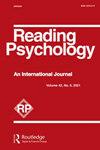Meta-strategic Learning of Structure Strategies in Reading Comprehension of Expository Texts
IF 1
Q4 PSYCHOLOGY, EDUCATIONAL
引用次数: 0
Abstract
Abstract Meta-strategic learning refers to a mediated construction of knowledge regarding when, why and how to apply a group of strategies for accomplishing cognitive tasks. This study examined the effect of meta-strategic learning of structure strategies on reading comprehension of expository texts by secondary school students under whole-class instruction conditions. The effect of a meta-strategic intervention program was compared to that of a strategic program, which focused on a direct (unmediated) instruction of how to apply each structure strategy separately, and to a control group. Moreover, we explored the role of students’ engagement in class discussions and tasks in meta-strategic learning. Three structure strategies using texts from three school domains were taught during 9 double lessons. Programs’ effectiveness was examined by near- and far-transference reading comprehension tasks, and a strategic knowledge questionnaire given before and after intervention. Findings indicated that both programs were similarly effective in enhancing students’ reading comprehension skills and strategic knowledge. The unique benefits of meta-strategic learning were apparent particularly for high-engaged students in far-transference tasks and for all students in overt application of strategic elements during task completion. More research is required to explore further benefits for meta-strategic learning in small groups and over the long-term.说明文阅读理解中结构策略的元策略学习
本文章由计算机程序翻译,如有差异,请以英文原文为准。
求助全文
约1分钟内获得全文
求助全文
来源期刊

Reading Psychology
PSYCHOLOGY, EDUCATIONAL-
CiteScore
2.20
自引率
7.10%
发文量
28
期刊介绍:
Prepared exclusively by professionals, this refereed journal publishes original manuscripts in the fields of literacy, reading, and related psychology disciplines. Articles appear in the form of completed research; practitioner-based "experiential" methods or philosophical statements; teacher and counselor preparation services for guiding all levels of reading skill development, attitudes, and interests; programs or materials; and literary or humorous contributions.
 求助内容:
求助内容: 应助结果提醒方式:
应助结果提醒方式:


